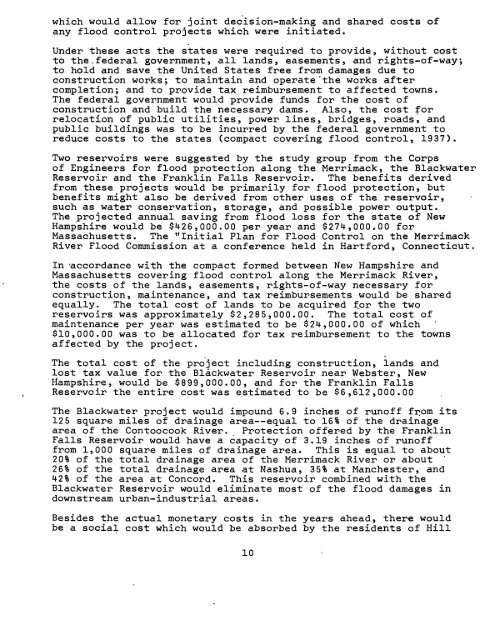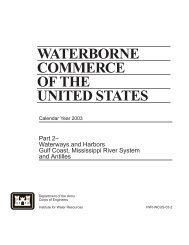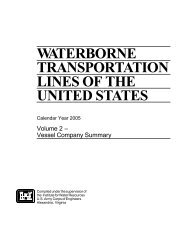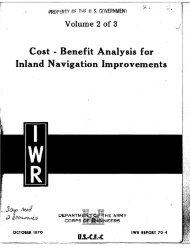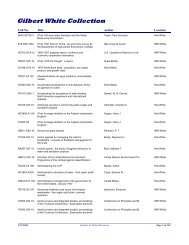; SP- IWR° CONTRACT REPORT 78-4... , UNDER ... - IWR - U.S. Army
; SP- IWR° CONTRACT REPORT 78-4... , UNDER ... - IWR - U.S. Army
; SP- IWR° CONTRACT REPORT 78-4... , UNDER ... - IWR - U.S. Army
You also want an ePaper? Increase the reach of your titles
YUMPU automatically turns print PDFs into web optimized ePapers that Google loves.
which would allow for joint decision-making and shared costs of<br />
any flood control projects which were initiated.<br />
Under these acts the states were required to provide, without cost<br />
to the.federal government, all lands, easements, and rights-of-way;<br />
to hold and save the United States free from damages due to<br />
construction works; to maintain and operate the works after<br />
completion; and to provide tax reimbursement to affected towns.<br />
The federal government would provide funds for the cost of<br />
construction and build the necessary dams. Also, the cost for<br />
relocation of public utilities, power lines, bridges, roads, and<br />
public buildings was to be incurred by the federal government to<br />
reduce costs to the states (compact covering flood control, 1937).<br />
Two reservoirs were suggested by the study group from the Corps<br />
of Engineers for flood protection along the Merrimack, the Blackwater<br />
Reservoir and the Franklin Falls Reservoir. The benefits derived<br />
from these projects would be primarily for flood protection, but<br />
benefits might also be derived from other uses of the reservoir,<br />
•<br />
such as water conservation, storage, and possible power output.<br />
The projected annual saving from flood loss for the state of New<br />
Hampshire would be $426,000.00 per year and $274,000.00 for<br />
Massachusetts. The "Initial Plan for Flood Control on the Merrimack<br />
River Flood Commission at a conference held in Hartford, Connecticut.<br />
In accordance with the compact formed between New Hampshire and<br />
Massachusetts covering flood control along the Merrimack River,<br />
the costs of the lands, easements, rights-of-way necessary for<br />
construction, maintenance, and tax reimbursements would be shared<br />
equally. The total cost of lands to be acquired for the two<br />
reservoirs was approximately $2,285,000.00. The total cost of<br />
maintenance per year was estimated to be $24,000.00 of which<br />
$10,000.00 was to be allocated for tax reimbursement to the towns<br />
affected by the project.<br />
The total cost of the project including construction, lands and<br />
lost tax value for the Blackwater Reservoir near Webster, New<br />
Hampshire, would be $899,000.00, and for the Franklin Falls<br />
Reservoir the entire cost was estimated to be $6,612,000.00<br />
The Blackwater project would impound 6.9 inches of runoff from its<br />
125 square miles of drainage area--equal to 16% of the drainage<br />
area of the Contoocook River. Protection offered by the Franklin<br />
Falls Reservoir would have a capacity of 3.19 inches of runoff<br />
from 1,000 square miles of drainage area. This is equal to about<br />
20% of the total drainage area of the Merrimack River or about<br />
26% of the total drainage area at Nashua, 35% at Manchester, and<br />
42% of the area at Concord. This reservoir combined with the<br />
Blackwater Reservoir would eliminate most of the flood damages in<br />
downstream urban-industrial areas.<br />
Besides the actual monetary costs in the years ahead, there would<br />
be a social cost which would be absorbed by the residents of Hill<br />
10


